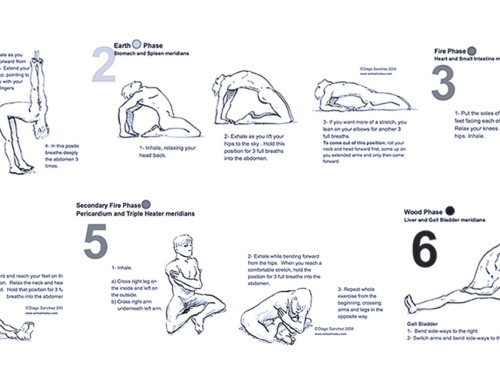Issues we are experiencing today are a result of traumas happened in our past.
Holographic Kinetics can help in finding the cause of them and clearing their effects. Sometimes emotions can manifest in our life as a result of spirits that we have trapped in our energy field. These invading spirits may as well be a result of a reciprocal exchange of energy, that is a consequence of our acts in the past.

The Emotional Life of the Body
In modern medicine, we tend to take a very mechanical view of the body and the physiological functions of its component organs. But in Greek Medicine and other traditional medical systems, the internal organs were seen as being strongly affected by the emotions.

These traditional notions of Greek Medicine are as follows:
Heart
The heart, being the principal organ of the Vital Faculty, is very sensitive to emotional states. Noble, expansive, uplifting emotions like courage, valor, honesty, forthrightness, altruism and compassion strengthen the heart and Vital Spirits, whereas ignoble, constrictive, base emotions like cowardice, timidity, guilt, remorse, deceit and duplicity weaken them.
Love and the emotional will to live are also very important to the heart; according to Greek Medicine, you CAN die of a broken heart. The heart, being the hottest organ in the body, is also very vulnerable to hot, turbulent passions, which can agitate the Vital Spirits to such an extent that they create a fever, which can be quite high and acute; Greek Medicine calls these fevers of energetic or emotional origin ephemeral fevers.
SHARE THIS ARTICLE
Lungs
The lungs, being an important noble organ of the Vital Faculty that works closely together with the heart, are sensitive and vulnerable to many of the same emotional states as the heart, and respond similarly.
The lungs need a feeling of psychic space within which to function; the phrase, “breathing room” is a common expression. The feeling of being smothered, invalidated, or denied one’s psychic space can constrict the lungs and cause respiratory problems like dyspnea and asthma.
Conversely, a feeling of dignity and pride puffs up the chest, and allows the lungs to expand and function properly.
Negative emotions that sap the will to live are also injurious to the lungs, especially grief and bereavement; many chronic respiratory diseases and conditions develop after a major loss or bereavement.
Throat
The throat is the body’s main communications center, and is connected with the Throat Canter, or chakra.
An inability to come out and speak one’s truth will often cause physical problems with the throat; in extreme cases, one may even become mute and unable to speak.
The throat is also the upper end of the digestive tract, and hence part of the Natural Faculty. Acute emotional tensions and anxieties can agitate the Natural Force in the liver, causing it to rise and get bottlenecked in the throat; one then feels like one’s choking on something, or has something lodged in the throat, a condition called globus hystericus.
Emotional gushings or catharses of sadness, grief or intense sentimentality will also cause a lump in the throat. Stuffing one’s emotions and feelings down one’s throat is injurious to its health, and will increase its vulnerability to dysfunction and disease.
Liver and Gall Bladder
Bile is produced by the liver and stored in the gall bladder, which makes these two organs vulnerable to negative Choleric emotions like anger, irritability, frustration, resentment, jealousy and envy.
These negative choleric emotions are stored in these organs, and can slowly eat away at them if allowed to fester.
Anger and rage can explode upwards from the liver into the head, causing a lot of havoc in their wake: headaches, migraines; red, sore, bloodshot eyes; and muscular tension in the neck and shoulders.
Nervous and emotional tension and stress, as well as melancholic emotions like pensiveness and worry, will stagnate the flow of the Natural Force in the liver, which in turn causes nervous, colicky, melancholic disturbances of the digestive functions.
This excess melancholy often accumulates under the lower ribs, giving a stuffy, distended, congested feeling in the whole chest and diaphragm area. This is the origin of the term hypochondriac.
Stomach
The stomach is a seething cauldron of emotions, and is intimately connected to the Gastric Center, or chakra, also called the Abdominal Center, which governs energy flow and distribution throughout the belly and gut.
Choleric emotions like anger, hate, rage and frustration stored here lead to gastritis, ulcers and other choleric stomach conditions. Many of us hold a lot of choleric emotions like anger and resentment in our gut.
Melancholic emotional stress and tension, as well as pensiveness, worry and anxiety, will stagnate the flow of the Natural Force in the stomach, causing distension, bloating, colic, gas and stomachache. And so, we must always try to be of good cheer when we eat.
If accumulated Choleric and Melancholic emotional tensions in the stomach and Gastric Center get very severe, we may experience anorexia, appetite disorders, giddiness, nausea and dry heaves.
Spleen
The spleen is the storage receptacle for black bile.
And so, it is adversely affected by negative melancholic emotions like pensiveness, anxiety, worry and depression, which unduly constrict the free flow of the Natural Force through the digestive system and aggravate the Retentive Virtue, producing colic, gas, distension and bloating throughout the entire abdominal area.
Actually a trio of subdiaphragmatic digestive organs can be adversely affected by negative Melancholic emotional states: the liver on the right, the spleen on the left, and the stomach in the middle.
Intestines and Bowels
The intestines are often the effect of psychosomatic or emotionally induced digestive disorders that arise in the upper digestive organs – the liver, gall bladder, stomach and spleen.
The upper small intestine, or duodenum, being very close to these upper digestive organs, is the part most affected; these emotional disturbances are usually of a Choleric or Melancholic nature.
In the middle and lower intestinal tract, Melancholic emotional disturbances are most injurious and keenly felt, because they aggravate the Retentive Virtue, producing colic and kinks in the intestines, or obstructions to their smooth flow and function.
Colon
Since the balanced, proper action of black bile is important to proper colon function, the colon is very vulnerable to aggravations and excesses of the Melancholic emotions – especially chronic or deeply held worry, anxiety and nervous or emotional stress and tension.
Security issues and deep insecurities will also impact negatively on the colon, since its functioning is intimately connected with the Root Center, or chakra, which pertains to our emotional security.
These Melancholic emotional disturbances usually produce disorders like constipation, irritable bowel syndrome, or spastic colon, but if the aggravation is severe, even colitis and more serious degenerative diseases may result.

Kidneys
Fright, fear and shock are most injurious to the kidneys.
The energetic flow of these emotions is downwards, as they take away the foundation of security and self-assurance that we have.
This also concerns the Root Center, or chakra, that root support or energetic foundation of strength and security that we have, which is closely connected to the kidneys and their balanced retention and evacuation of urine.
When beset with extreme fear or fright, many lose control of their kidneys and bladder, and urinate spontaneously.
Adrenal glands
The adrenal glands, sitting right on top of the kidneys, are injured and drained energetically by excessive stress.
The adrenal medulla and its fight-or-flight adrenaline response is excessively provoked by acute stress and emotional outbursts of anger and the like in those whose lives have become an overdramatized emotional roller coaster.
Chronic stress aggravates the functioning of the adrenocortical hormones like cortisol, which can lead to weight gain, especially in the lower body and midriff, as well as rising blood sugar, if the stress is constant and unresolved.
Since the adrenal glands provide the energetic support for healthy urinary function, the health, vitality and functioning of the kidneys will also be drained, and adversely affected by weakened or challenged adrenals.
Male Reproductive Organs
Since the male reproductive organs are closely linked, both functionally and anatomically, to the kidneys and urinary tract, negative emotions that adversely affect the kidneys, like fear, fright, shock and anxiety, will adversely affect male sexual function as well.
Male impotence or sexual dysfunction, doesn’t always have a physical cause; it can also be emotionally or psychosomatically induced by feelings of fear, inadequacy, insecurity or performance anxiety, which often operate on a subliminal level.
Since the main energetic flow of these emotions is sinking and downwards, there may also be incontinence of sperm or premature ejaculation.
Since the adrenal glands, particularly the adrenaline response, provides the energetic support for both urinary and sexual function, or response, in the male, men who don’t live a balanced, well-regulated emotional life and drain their adrenal energy will also find that their sexual performance suffers.
Female Reproductive Organs
Optimal female sexual response depends on a warm feeling of emotional closeness and intimacy with her partner.
If this trust and intimacy are violated, there will be emotional trauma that can adversely affect female sexual health and response. This is not an absolute, all-or-nothing matter; there are many degrees of violation, ranging from a subliminal lack of proper tact and sensitivity in the male to outright rape and physical violation.
These negative experiences will traumatize the woman, to a greater or lesser degree, depending on their severity, provoking feelings of fear and anxiety which will further inhibit sexual functioning and response. This is often called frigidity, and closes down the woman’s feelings and receptivity to orgasm.
Many women have had to disconnect emotionally from their sexual organs and their functioning as the only way of coping with a sexual life or circumstances that are completely unsatisfying and uninspiring.
Losing a pregnancy also brings an aura of great grief and sadness to the female organs, and to the woman herself; many women take a long time to heal emotionally from a miscarriage or an abortion.
Brain
The brain comes last in our discussion of the emotional life of the organs because it’s often the effect of humoral and metabolic imbalances arising elsewhere in the body, which send subtle vapors up to the brain to influence its functioning.
Choleric vapors agitate, irritate and inflame, provoking anger, rage, envy, jealousy, or irritability.
Warm, moist Sanguine vapors can stir up feelings of wellbeing, pleasure, sensuality or even lust.
Melancholic vapors provoke feelings of prudence, caution, pensiveness, worry and withdrawal.
Cold, wet Phlegmatic vapors will dull or fog up the brain, producing mental lethargy and dullness, or they will cloud objective thinking with excessive sentiment and subjectivity.
However, the brain is not all effect; it can also be cause, since the kinds of thoughts that it habitually thinks can have a profound impact on the heart and its Vital Spirits, and hence on the entire Vital Faculty, for better or worse. And so, we have come full circle, and again return to the heart.
Conclusion
The proper balance and regulation of our emotional life is an important part of our daily hygiene. It’s important not only to the health of the mind, but, as we have just seen, to the health of the body, and all its internal organs.
source: David K. Osborn L. Ac., Emotions and Organs – GreekMedicine.net






Leave a Reply